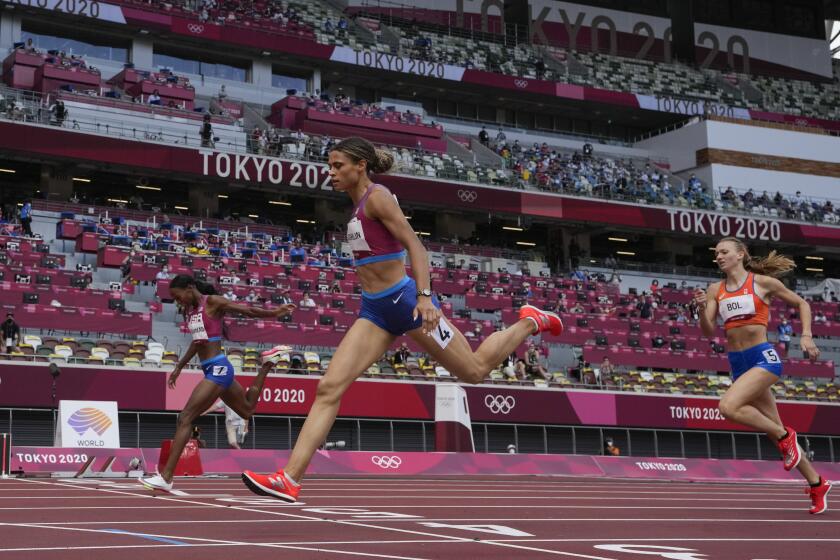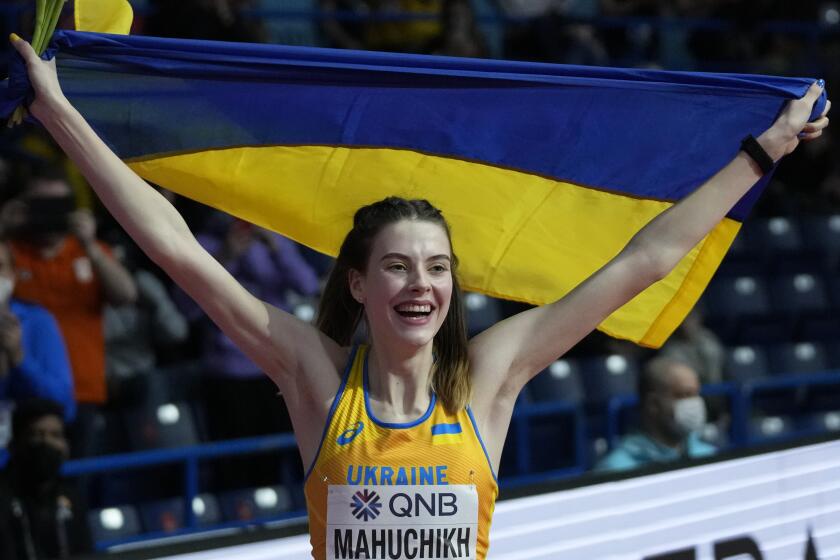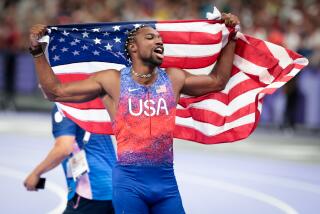Jake Wightman’s stunning 1,500-meter win makes for surreal family moment
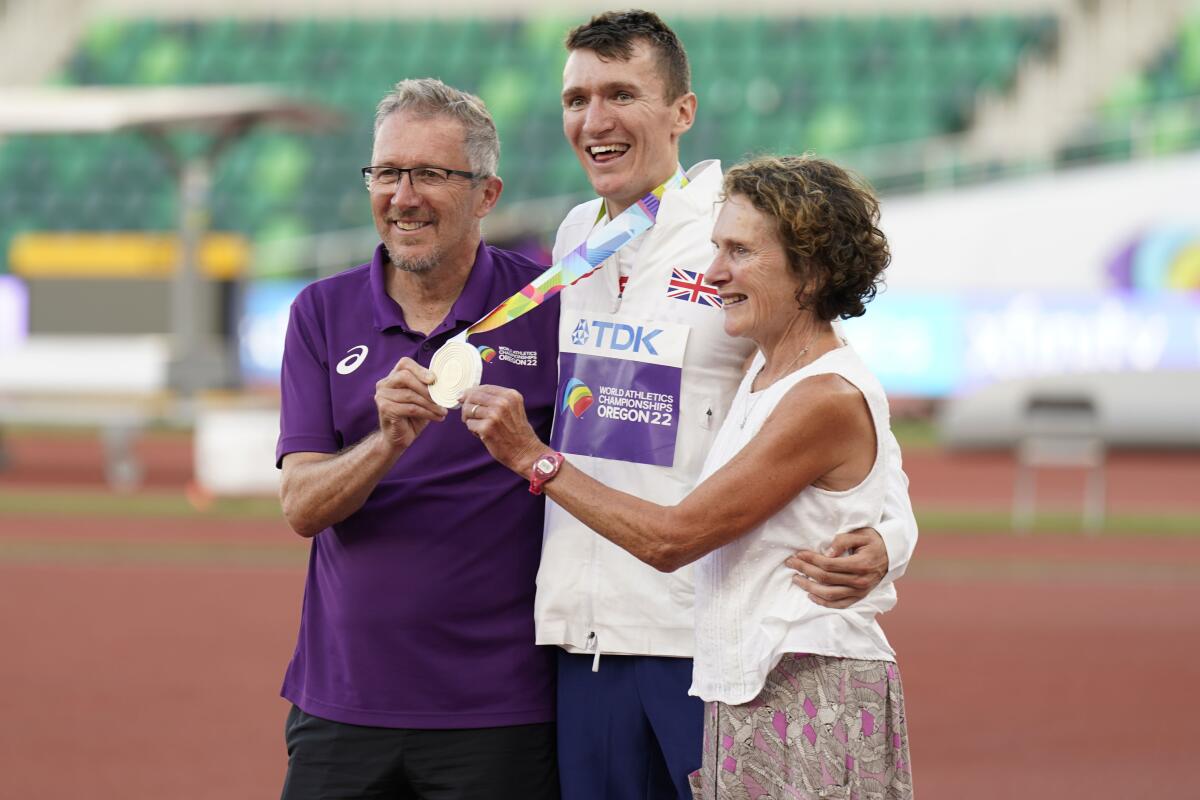
EUGENE, Ore. — In the uppermost row of Hayward Field’s Section 222, Geoff Wightman looked away from the men’s 1,500-meter medal ceremony taking place on the track two decks of grandstands beneath him and allowed his gaze to drift into the Coburg Hills. He blinked twice, breathed deeply once and, after a pause, his voice carried through the public-address speakers across the stadium.
Wightman, an in-stadium commentator whose voice has been the soundtrack for the track and field competitions during the London and Tokyo Olympics and world track and field world championships for a decade, knew all he needed to do was to read the script in front of him and fill in the winner’s name.
His son’s.
“It’s just another name,” he said. “I just didn’t want to mess it up for him by doing anything wobbly.”
On the fifth day of the world track and field championships, as expectations were upended and favorites pushed a place down the medal stand, no result was more stunning and surreal than Jake Wightman’s 1,500-meter gold medal in 3 minutes 29.23 seconds, a victory the British runner sealed by passing Olympic champion Jakob Ingebrigtsen with 200 meters to go.
“I didn’t hear him at all after I crossed the line or finished,” Wightman said of his father. “It was just the surreal moment of, has this actually happened? I was trying to look for him and he’s up in the nosebleeds, so far up.”
As he exploded, running to hug his mother, Susan, in the front row of the track’s first curve, his father sat on an elevated stage underneath the stadium’s translucent roof, attempting to do the opposite. He told himself to “keep it neutral.”
“I hope it’s a special moment for him,” Jake Wightman said, “because who else in probably in the history of athletics has ever had their father calling a title like this — and a coach, as well, to be able to be there and have that?”
After he’d removed a black headset and hugged his colleagues, Geoff Wightman called it the best sports-related day of his life. Only the births of his three children and his wedding day ranked ahead.
The novelty wasn’t announcing the race. He has commentated on his son’s runs since Jake was 10, able to attend the school races because his wife was Jake’s physical education teacher.
“We’ve just taken it to slightly bigger stadia and slightly bigger crowds and slightly bigger medals,” the father said, his eyes creasing behind his glasses.
In some ways, he had called the victory privately the previous day, when he and his son discussed race strategy. Both knew the path to victory required Wightman using what he called his only advantage against Ingebrigtsen, a preternaturally talented distance prodigy at just 21 whom Wightman had last beaten a dozen years earlier: a speedy last kick.
“You can run safe and hang back in fourth, fifth or sixth and you’ll probably get a bronze medal, and you’ve never had that before,” Wightman had told his son. “But how many times in your life do you get a world championship where you’re in this kind of form, and if you just take a risk, you’d always regret not taking a risk when you’re capable of winning it.
“…You don’t have to beat [Ingebrigtsen] every time out. You just got to have a plan for once. And the once was, if you can stick with him and be level in the straight, you can do it.”
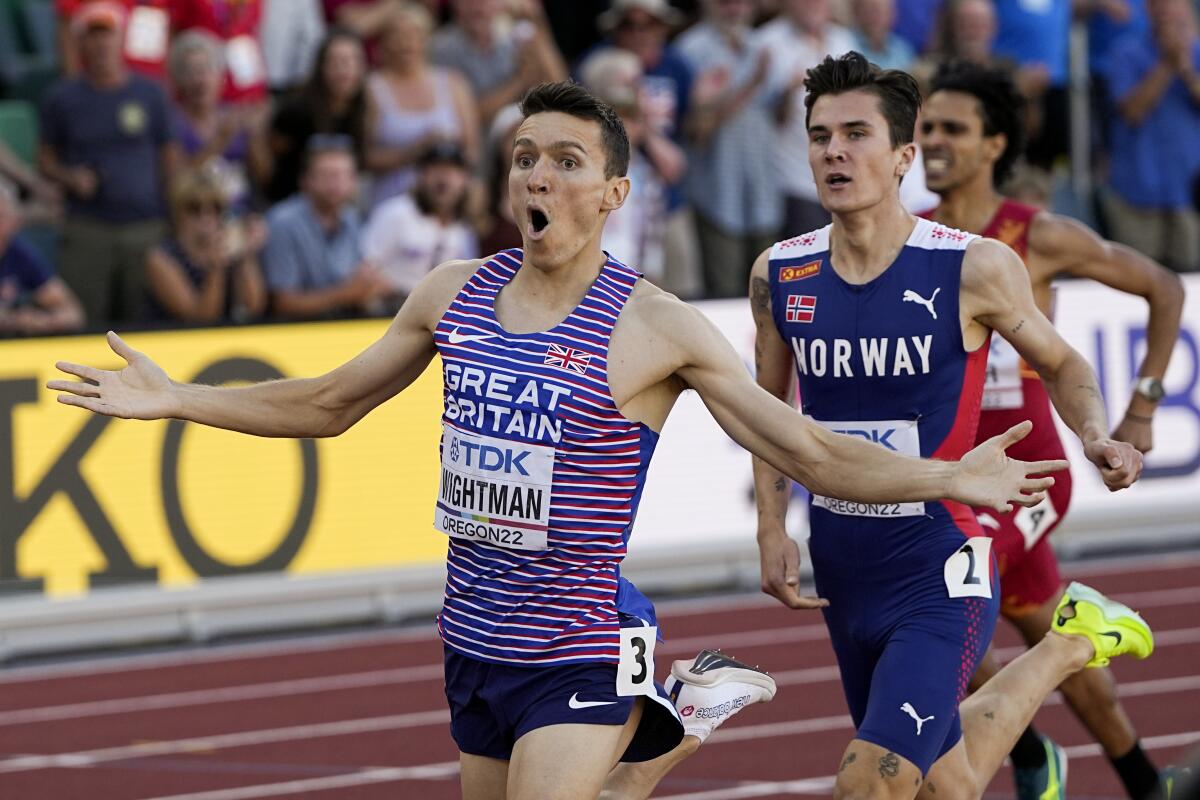
Watching that plan come to fruition, the father called the victory again, this time in real life, for more than 10,000 fans.
“Just across the line was the biggest relief and the pinch-me moment I’ve ever had,” Jake Wightman said.
It was not the day’s final upset. Limited by a hamstring injury suffered last month, Karsten Warholm, the Norwegian world record-holder in the 400-meter hurdles, a world champion in 2017 and 2019, and Olympic champion in 2021, could not produce the duel with American Rai Benjamin that had been eagerly anticipated since each broke the world record in last year’s Olympic final.
Warholm pounded his chest and cheeks with each hand and screamed into a camera during his introduction, a prerace routine that is his signature. Benjamin was more serene, looking into the grandstands’ second level and gently bumping his chest.
The world championships begin with what USA Track & Field officials call a critical window for hopes of becoming the fifth-most popular sport in the nation.
But as Warholm faded over the last 150 meters and Benjamin surged, Brazilian Alison dos Santos was already too far ahead to catch. He is the oft-forgotten third star at the distance. His bronze-winning time in Tokyo would have beaten the 29-year-old world record set by Kevin Young before it was demolished by Warholm twice in a matter of weeks last summer, eventually lowered by nearly one second.
Steps after finishing Tuesday in the third-fastest time ever at 46.29 seconds, Dos Santos cupped a hand to his ear in front of the crowd. He heard roars, which were also for the Americans behind him, with Benjamin earning silver in 46.89 seconds and Trevor Bassitt bronze.
“Today I went all or nothing,” Warholm said, “and unfortunately, it was nothing.”
Benjamin had contracted COVID in May and later tendinitis in a hamstring. When he physically couldn’t train for stretches this spring with USC coach Quincy Watts, he also fought himself mentally, he said.
“It’s been rough,” he said.
Ukraine’s track and field athletes believe there is power in claiming territory, whether around battered cities or atop an awards podium.
Entering the final, Benjamin told Watts of his plan to remain mentally strong “and I’m going to let the U.S. crowd be my medicine.”
“The backstretch I found myself out of the race a little bit,” Benjamin said. “And the crowd erupted, ‘U.S.A., U.S.A.,’ and I just like, all right, we got to compete, we got to fight.”
Other than American hurdlers Sydney McLaughlin and Dalilah Muhammad, who qualified easily for the 400-meter semifinal, Ukrainian high jumper Yaroslava Mahuchikh received the loudest applause during early introductions as she blew a kiss into a camera, wearing the Ukrainian colors of yellow and blue. Nearly five months earlier, on Feb. 24, she had fallen asleep at around 3:30 a.m. in her hometown of Dnipro, central Ukraine, only to awaken one hour later to what she believed was the sound of shelling. She woke her boyfriend and called her father.
“I say, ‘War has started, war has started!’” she said in May.
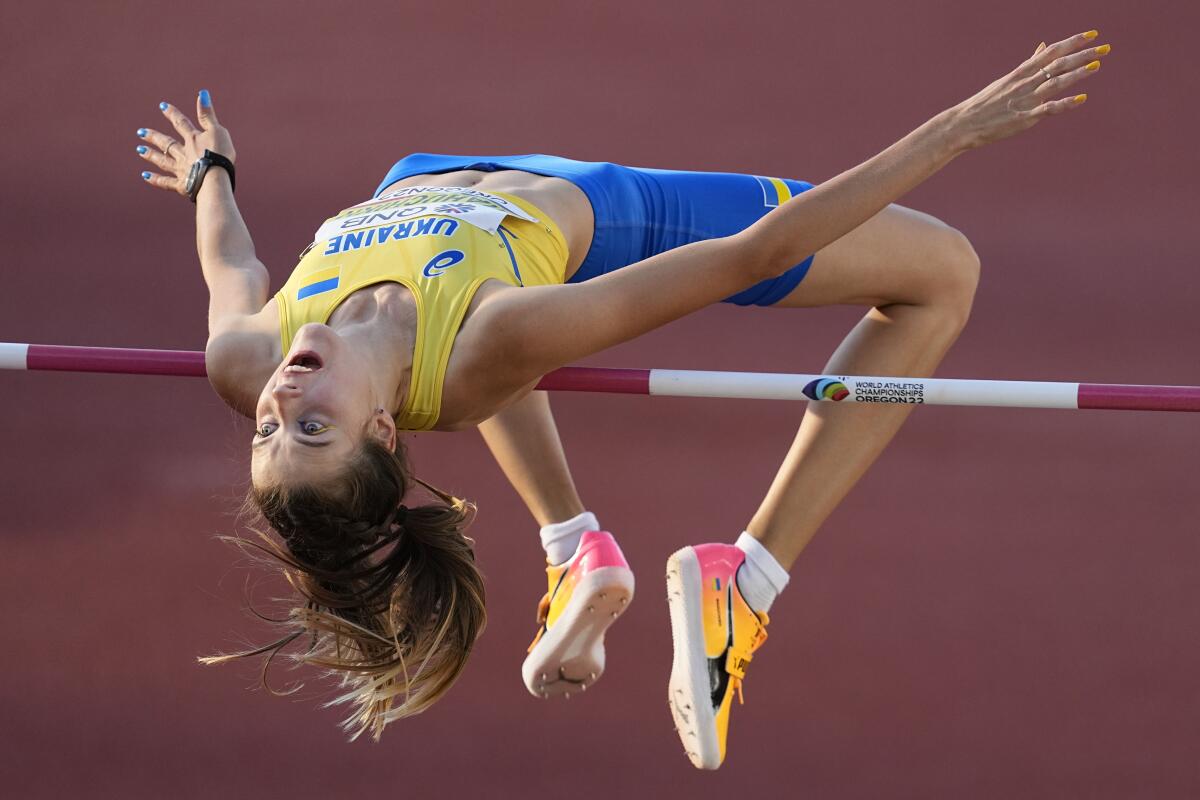
After a time spent in a home’s cellar and a three-day car ride to Belgrade, the site of the world indoor championships, she emerged as a world champion and something of an unofficial spokesperson for Ukrainian athletes. More than 300 athletes have been relocated by the country’s track and field federation since February; Mahuchikh’s story, by virtue of her championship, may be the best known. Wearing blue and yellow eyeliner, she sailed over her first four bars before missing at 6 feet, 7½ inches, and when Australia’s Eleanor Patterson made the height on her first attempt, it proved the difference between silver and gold.
For Wightman, that difference was amending the mistakes that saw him win his semifinal heat in Tokyo last year only to fade during the Olympic final. During the winter, he focused his training on 3,000 meters, believing it would build his endurance for championship meets with multiple rounds. His mother believed a win was possible because of how easily he had sailed through qualifying this week.
Amid his victory lap, Wightman looked up and saw Steve Cram in a stadium box. The British 1,500-meter champion at the 1983 world championships waved. Sebastian Coe, World Athletics’ president and the 1984 Olympic champion at the same distance, whom Wightman considers a hero, told the 28-year-old after the medal ceremony that this was the “best medal he could have given out.”
As his father scampered down through the grandstands to the track, finally embracing his wife, their son was a few rows higher, moving from one television interview to another. Geoff Wightman sneaked up a staircase and found his son for a hug.
“It was surreal watching it,” Geoff Wightman said, “because you’re thinking, ‘I know that guy, he has a familiar look.’”
More to Read
Go beyond the scoreboard
Get the latest on L.A.'s teams in the daily Sports Report newsletter.
You may occasionally receive promotional content from the Los Angeles Times.

